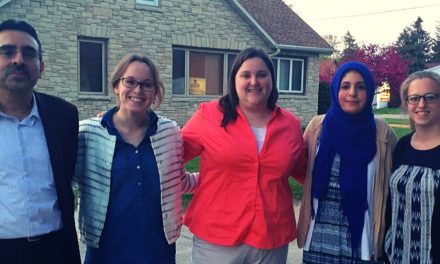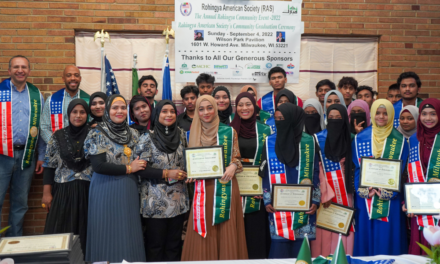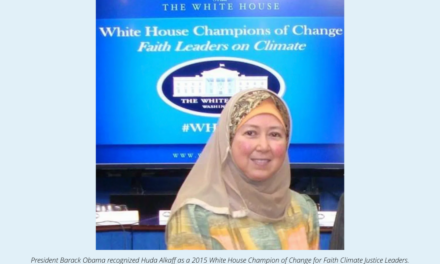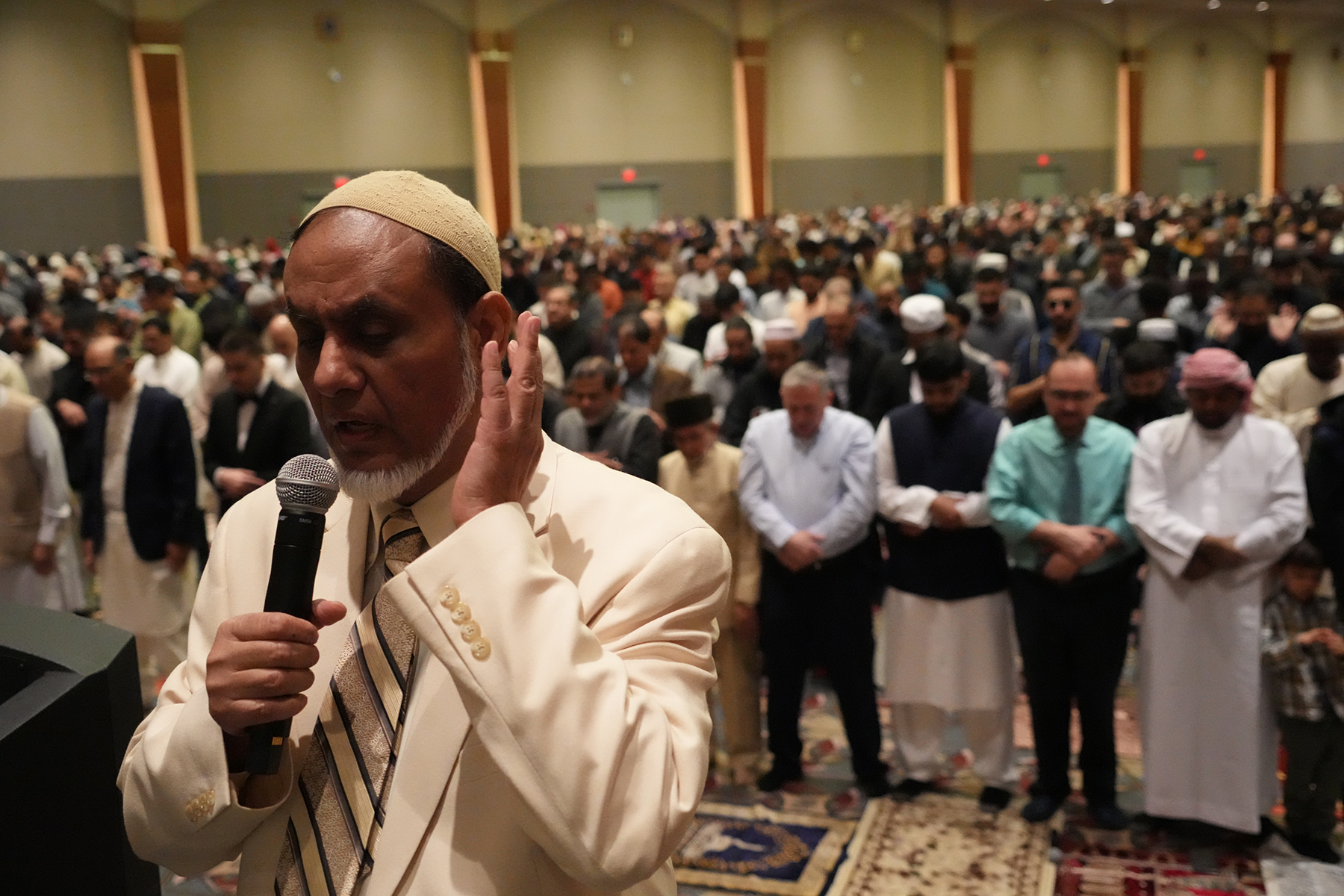
Photo by Wisconsin Muslim Journal
Dr. Zulfiqar Ali Shah led the Eid al-Fitr prayer service in 2023.
Dr. Zulfiqar Ali Shah will move to Michigan this week to become the director of religious affairs for the Islamic Association of Greater Detroit and the imam of its masjid.
“With Dr. Shah’s guidance, we aim to make IAGD a leading Islamic Center in the country by offering scholarly programs that educate and enhance our knowledge of our religion,” says a statement on the IAGD website. “We are confident his vast knowledge and experience will help us grow and strengthen our community.”
Dr. Shah plans to leave Milwaukee Thursday. He will lead his first Jummah prayer at IAGD this Friday.
IAGD recently completed a $20 million expansion, which will be inaugurated March 2 with state and local officials and Muslim dignitaries from around the country. Shah needs to be there to be part of the team planning for the inauguration, he said.
In an interview Sunday with the Wisconsin Muslim Journal, Dr. Shah spoke about the mix of happiness and sadness he is feeling as a new beginning and ending draw near.

Photo by Shan
Sheikh Zulfiqar Ali Shah, Ph.D., is the new religious affairs director of the Islamic Association of Greater Detroit.
Prepared to have an impact
IAGD’s website describes Dr. Shah as “a leading voice in the realms of Islamic scholarship and academia. As an accomplished theologian, thinker, historian, jurist and leader, he seamlessly integrates traditional Islamic heritage with contemporary knowledge, making him an influential Muslim voice both in the Muslim and Western world.”
Indeed, his educational background is unique—including traditional Islamic education and advanced studies in comparative religion. A hafiz (one who has memorized the entire Quran) since youth, he has bachelor’s and master’s degrees in Islamic Studies: Usuluddin from the International Islamic University in Islamabad, Pakistan. He earned a Ph.D. in Theology and Religious Studies at the University of Wales in the United Kingdom.
He is a former president of Sharia’ Scholars Association of North America and Islamic Circle of North America. A prolific researcher, he is author of multiple books and articles. Shah also serves as executive director and secretary general of the Fiqh Council of North America, the highest Muslim juris body on the continent.
Shah said he feels fortunate his educational background, as well as his mastery of multiple languages (he is fluent in English, Arabic, Urdu, Punjabi and Hindi, and has “working knowledge” of Persian and Pashto), helps him connect with others across faiths, cultures and languages. He named a Christian bishop and a Jewish rabbi among his closest friends.
“I can speak directly from my heart to 90% of the community,” he said.
The IAGD Facebook page enthusiastically announces Dr. Shah’s appointment, noting he “has contributed immensely to spiritual spheres across the world.” IAGD’s Muslim community in a northern suburb of metro Detroit anticipates “continuous growth under his guidance,” a Facebook post said.
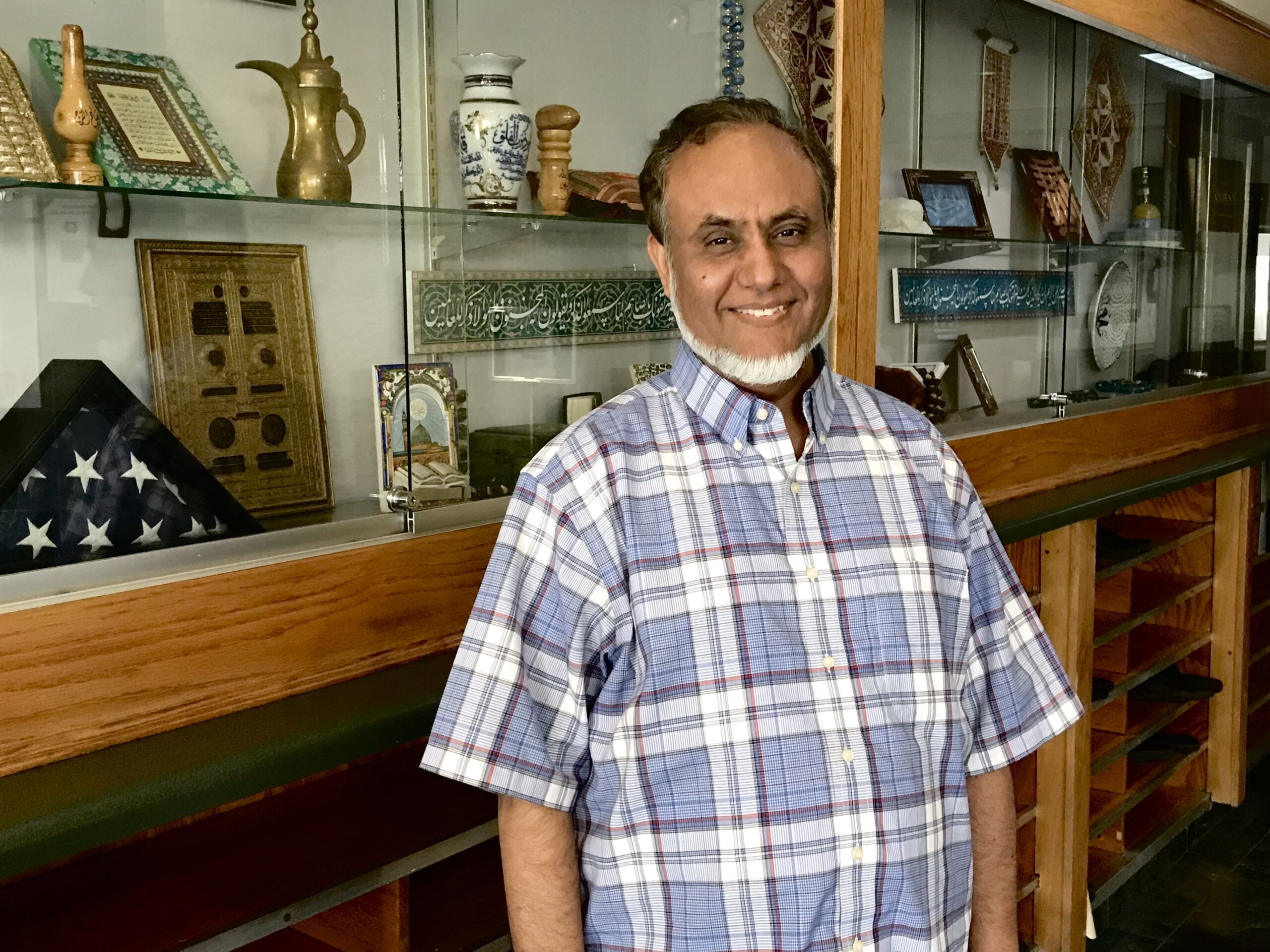
Photo by Cherrie Hanson
Dr. Zulfiqar Ali Shah poses for WMJ at the Islamic Society of Milwaukee in 2022.
An expansive role
“Some of IAGD’s founding families are from my hometown. IAGD was established in 1978 by Pakistani and Indian physicians who moved to the area in the late 1960s,” Shah explained. Its community is about 60% Pakistani, 30% of Indian origin and 10-15% Arabic.
“I have known the leadership there for a long time—for decades,” Shah said. “They are just like part of my family. I have been traveling there quite often and have been part of the fundraisings and the functions over there. For about 25 years, it has been my second home.”
IAGD also offers Dr. Shah an expansive role. Being in Greater Detroit, he will be in the midst of one of the largest Muslim communities in America. IAGD has a mufti (an Islamic jurist qualified to issue fatwas on points of Islamic law) and a full-time imam, in addition to a religious director. It also has youth directors and a school principal among its leadership. And Shah plans to hire another imam soon after his arrival.
Anticipating his move, Shah said, “I am very happy the leadership there knows me very well. I have worked with them for a long time, and they’ve got a grand vision.”
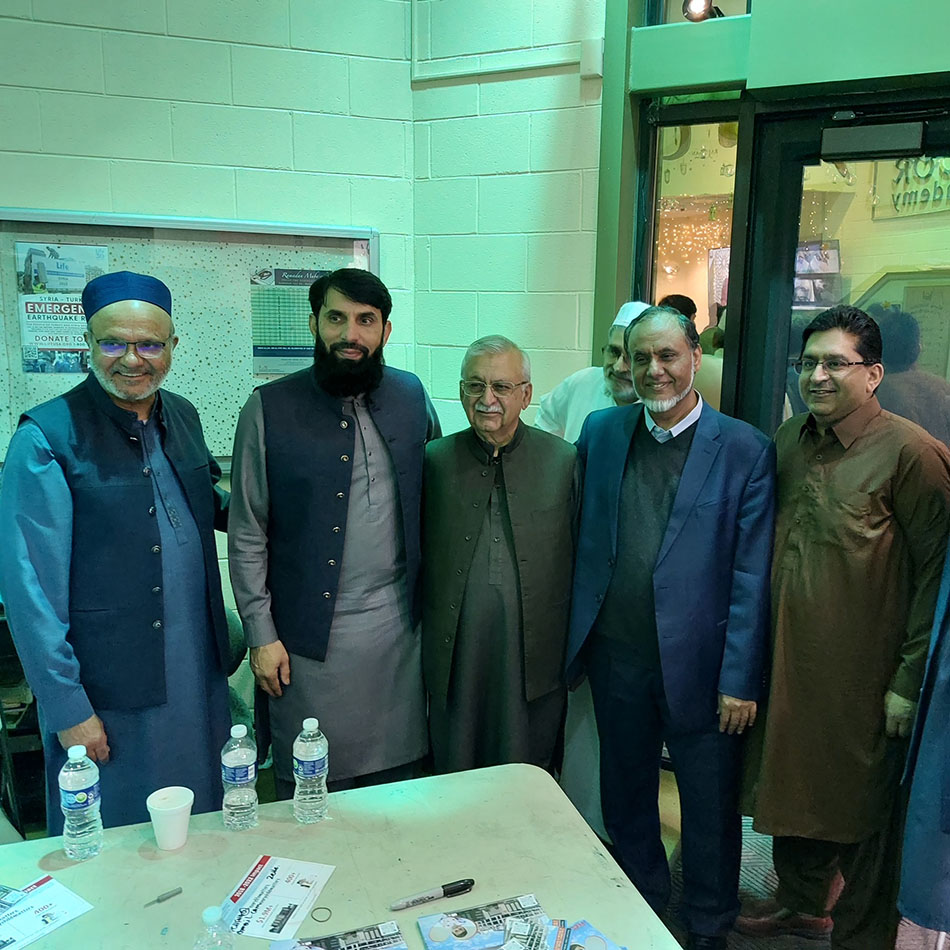
Dr. Zulfiqar Ali Shah (fourth from left) with board members and trustees at the Islamic Association of Greater Detroit.
Milwaukee Muslim community’s special charm
“Leaving Milwaukee is difficult,” said Shah, who served as the Islamic Society of Milwaukee’s religious director for almost 19 years. He joined ISM in January 2006 but served the community as a visiting scholar since 2003. He lived in Florida at the time and recalled Waleed Najeeb, M.D., enticing him with Milwaukee’s weather, and he was not joking. He struggled with allergies in Florida. Wisconsin’s long, frigid winters and short summers cured him, just as Najeeb promised.
“I love ISM and the Milwaukee Muslim community,” Shah declared. “They are my family and it is difficult to leave your family.”
Unlike some Muslim communities, Milwaukee’s is not so large that ethnicities segregate, he noted. “The community is well-knit and very close. Everybody knows you by name.”
Dr. Shah and his family have been very happy in Milwaukee, he added. (He has seven children, ages from 3 to 32.)
“The people here are very loving,” he added. “Honestly, Milwaukee is going to be a part of my life for the rest of my life.”

Photo by Shan
The expansion of the Islamic Association of Greater Detroit includes a large prayer hall.
Milwaukee Muslim community’s exponential growth
Asked what accomplishments in Milwaukee he is most proud of, Shah said, “I will not take the credit for everything, but our organization, ISM, has grown exponentially. I have seen it grow with my own eyes.
“The community’s participation and their sacrifices have made the ISM and our Muslim community one of the strongest in America,” he continued. “We went from one masjid to three main masjids. And look at Salam School, a full-time K-12 accredited school with over 1,000 students, one of the largest Islamic schools in the country.
“In Milwaukee, with ISM and our sister organizations, we have a Quran and Arabic Institute, Core Academy for youth, strong interfaith engagement, a full-time health clinic with a senior center and a counseling center, strong social services, a refugee program, Zakat distribution programs, a food pantry and many other unique community programs. Every week something is happening in the ISM facilities.”
Different visions
Yet, sometimes Shah “struggled here because the ISM leadership focused on the local community,” he admitted. “Participating in the national and international Muslim communities was not among their priorities.”
With publications and speaking engagements beyond Milwaukee, “I thought I was helping ISM by taking its name all over,” Shah said. In contrast, “in Detroit, they want me to play a role not only on the city level but on regional, national and international levels.

Dr. Zulfiqar Ali Shah is a world-renowned scholar.
“I feel my research work is needed by the national and international Muslim community, he said. “It is needed for Muslims born and raised here. And it is also relevant to the community at large, to Jews and the Christians, so they can know how Islam was the source of inspiration of Jewish civilization during the medieval time.” Historians say famous Jewish scholars of old were imitators of Muslims and products of Islamic civilization, he said.
Likewise, important Christians like St. Thomas Aquinas studied the Muslim philosophers, Shah said. So did America’s founding fathers. “In the modern world, especially after World War II, the history of Muslim contributions to Western civilization has been erased. Some don’t want to see the Islamic world as equal or being able to challenge them.”
“I want to share my research and knowledge at national and international levels, and I was feeling unable to do this in Milwaukee,” he explained. “I was a national and international leader before coming to Milwaukee.” At one time, the Muslim leadership in Milwaukee was considering developing national and international institutes, Shah said. “If they had, I would not move on.”
Parting words
Even as he prepared to leave, Shah shared a request with the Milwaukee Muslim community. “I see people sitting back and blaming other groups for not letting them in. I request the community to participate in the organizations, be part of the committees and get involved in the ISM. We need diversity within our leadership and that won’t happen if a variety of people don’t step up and spend time to serve the community. They need to volunteer, be part of the organization and serve so they can move up into leadership roles.”
Shah also hopes the Milwaukee community will call on him whenever he can be of service, he said. “I’ll always be part of this community.”
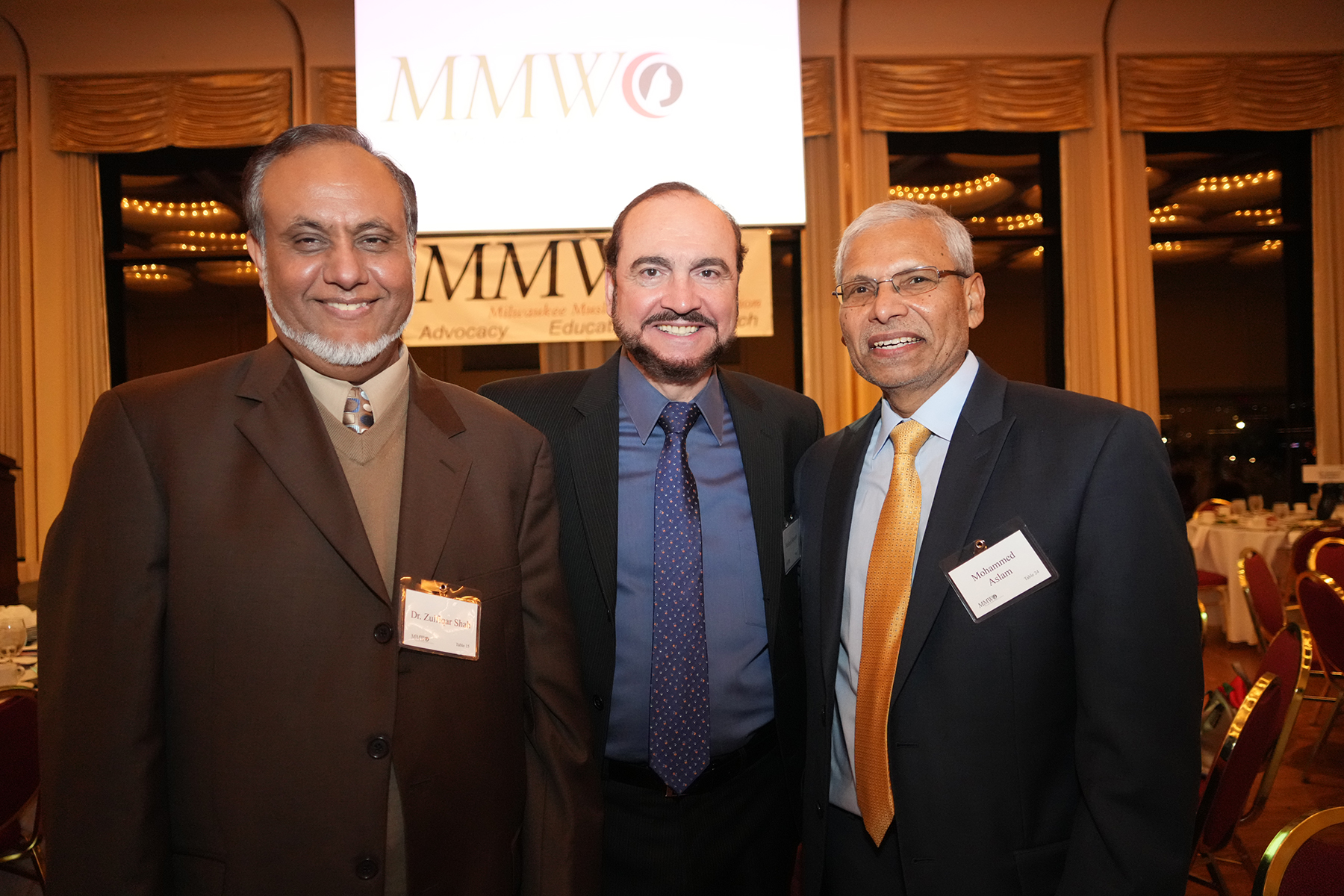
Left to right, Zulfiqar Ali Shah, Ph.D., Waleed Najeeb, M.D. and Mohammed Aslam enjoy the Milwaukee Muslim Women’s Coalition’s 2022 Gala.
Dr. Shah will be missed
“The correct knowledge of Islam is the most important component in any Muslim community,” said ISM religious chair Waleed Najeeb, M.D., who was part of the search committee that hired Shah in 2006. “I wanted someone with the knowledge to be a check for us, someone who could correct our course when needed.”
Shah’s answer to questions about contemporary issues impressed Najeeb. “He didn’t just give his opinion. He gave you the opinion of so many scholars, going back 100 years to today. He could tell you where each opinion was coming from. His knowledge is so present and accurate, I knew he was the kind of person we would like to have here.”
Although Shah had “a big impact here over the past 18 years,” it could have been so much more, Najeeb said. He envisioned having Dr. Shah lead discussions that tapped his knowledge of the intricacies of Islam, hosting scholarly discussions and seminars, or maybe even starting an Islamic seminary, but “he was dealt with as an imam. When a scholar is used as an imam, which is not his specialty, it’s a waste of the knowledge he could have given the community.”
Nevertheless, “Dr. Shah loved the community and the community loved him,” Najeeb said. “I’m happy for him—that he found a community that will appreciate his knowledge. I wish him the best but it is the biggest loss our community has faced.”
Shah’s background in comparative religion helped ISM grow in interfaith engagement, Najeeb added. “Even scholars of other faiths respected his expertise. No one disputed his discussions of Christianity or Judaism.”
Mohammad Kher Heder, M.D., a neurologist, participated in multiple programs Dr. Shah led at Masjid Al-Noor in Brookfield and at the Islamic Resource Center in Greenfield. “It was very satisfying. Dr. Zulfiqar has deep Islamic knowledge and an intellectual approach. His level of knowledge is unique. I learned a lot throughout the years from him.
“He was able to benefit the community at large with his knowledge but we were also able to work together in a small group to go into very difficult questions about Islam,” he said. “With his great background in Islamic history, he would be able to get to the root of issues. And with his background in comparative religions, we were able to discuss the relationships of Islam to other faiths.”
In addition, Shah and Heder worked together on outreach programs held at the mosque on the University of Wisconsin-Milwaukee campus. “Dr. Zulfiqar is very capable of establishing dialogue with other faith groups.”
Mohammad Fareed, M.D., of New Berlin was on the ISM shura when Shah was hired in 2006. “In the years shortly after 9/11, his ability to start dialogues with other faith groups was very valuable to our community,” he said. ISM organized visits to churches and synagogues and invited them to visit the masjid.
“When you grow up in your own religious community, what you see in others are mostly differences,” he said. “But when you go to interfaith, then you understand each other better and create friendships across religions, and notice all the things you have in common.”
Another issue Dr. Shah helped resolve was when to begin and end Ramadan, the annual month of fasting, Fareed said. “It was huge, not just locally but nationally and internationally.”
In the past, Muslims depended on sighting the first glimpse of the crescent moon as a sign of the beginning and end of Ramadan. “It used to cause confusion and arguments. How confusing it was if you wanted to take the day off for the Eid! People attending different mosques celebrated the Eid on different days. We rented a location for the Eid prayer for two days since we didn’t know when the moon would be sighted. Imagine the money that was wasted!
“Dr. Shah was able to bring some authority and knowledge to the issue and we came to an agreement under his guidance,” Fareed said. “He wrote a book about how you could calculate it. It was very convincing.”
Fareed listed other numerous important impacts Shah had on Milwaukee’s Muslim community, including starting the Quran and Arabic Institute for youth, raising funds for ISM and for a range of projects (a Muslim funeral home, support for families in need, for the Burmese/Rohingya, Syrian and Afghan refugees, for victims of a large earthquake in Pakistan and more).
Dr. Shah also served the community by visiting the sick and assisting families with funerals, Fareed said. “He was easily accessible to all. He never said no. He maintained strong personal connections with community members.”
Drs. Najeeb, Heder and Fareed all say they hope the Muslim community in Milwaukee will continue to benefit from Dr. Shah after he moves. “Hopefully we can bring him for specific lectures and programs,” Najeeb said.
